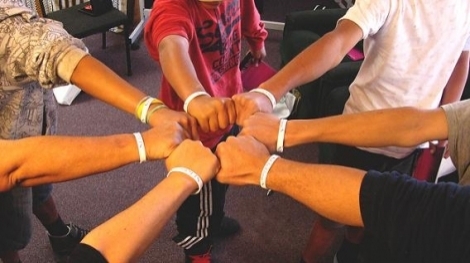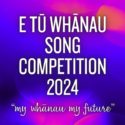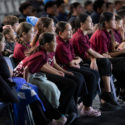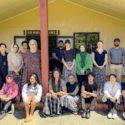Take 14 young teen boys from Te Whakatōhea, put them together for three weeks with people who genuinely care about them, create an awesome tikanga based programme to build their self-esteem that includes hunting, shooting and fishing, provide follow up support, and you’ve got a recipe for success!

 That’s what Te Wheke Atawhai did to tackle the issues troubling these rangatahi – all referred by their schools for “challenging” behaviours. Te Wheke Atawahi is a health centre based in Opotiki and managed by WISH (Whakatohea Iwi Social and Health Services).
That’s what Te Wheke Atawhai did to tackle the issues troubling these rangatahi – all referred by their schools for “challenging” behaviours. Te Wheke Atawahi is a health centre based in Opotiki and managed by WISH (Whakatohea Iwi Social and Health Services).
WISH had big aspirations for these rangatahi – that they would find things to feel good about, that they would build their confidence and skills, and start thinking positively about their own futures and dreams. E Tu Whānau came on board with some funding for this innovative proposal, and things got underway.
Creating positive change
Te Wheke Atawhai started by employing teacher Raymonde Te Puni to work alongside the team to design a programme. The plan was to create a programme that would challenge and strengthen these rangatahi who wanted to change their lives in relation to violence, depression, anxiety and resulting problems with their relationships and behaviours.
The end result was a three-week, live-in course with 14 rangatahi from Opotiki College and Pouawhitia (alternative education centre) completing the first programme. It has been a huge success that has kicked off a process of change for the young men. Their positive responses have gone way beyond everybody’s expectations.
The three-week programme
In week one, the focus was on developing self-discipline and the foundations for change. The team from Te Wheke Atawhai created context by looking at the past – the good and bad things that have affected the lives of the rangatahi. These included the impact of the Treaty of Waitangi, tikanga, gangs, drugs – and their place in Te Whakatōhea. This week helped give the boys a ‘rite of passage’ experience in the best way possible and it was also very rewarding. The boys went fishing – something many of them had never done before.
“They were very proud that they caught so many kahawai they were able to offer them to Omarumutu Marae where a tangi was being held.” says team member Ian Linton.
The second week involved the Pathway Planning provided by Kairaranga from the Whānau Ora Collective Te Ao Marama. This challenged the youth as they struggled to see a different kind of future for themselves. But as the week progressed and trust built, things started to shift.
Week three was about the future. A trip north opened the boys’ eyes to a range of tertiary learning possibilities – the Bay of Plenty Polytechnic in Tauranga, Wintech in Hamilton, Massey University, the airforce base, and Manukau Police Station. They were visibly energised by the trip and impressed their hosts at Devonport Naval base with an early morning run.
Marae-based finish to programme
Opotiki’s Kuatere marae hosted the last two days of the course, and the boys were supported to review their plans.
“Finally they were beginning to dream, to aspire to the possibilities they had started to believe they could achieve,” said Raymonde.
They also used this time to organise a hākari for their whānau to mark their graduation. The boys worked hard. It was an emotional moment for everyone when each of the boys presented their Path Plans to their whānau and manuhiri.
Raymonde spoke to whānau at the event, challenging them to look at the environment they were raising their tamariki in. Te Wheke Atawahi Manager Louisa Erickson reinforced the message.
“Our young people are not the problem – they are the product of parenting and environment. We cannot succeed in changing the lives of rangatahi if we don’t work with these two contributors.”
Course rated “awesome”
The programme evaluation was overwhelmingly positive – 91% said the programme was “awesome” while 9% rated it “cool”. Over 80% said that the programme helped them learn about planning and achieving their future aspirations.
The three-week programme has finished but the journey is not over. Raymonde is now part of the WISH team and will continue to work with the young men. He also has a good relationship with the boys’ schools.
Louisa sums it up. “We created a bubble of safety and trust for the participants and attitudes and behaviours changed for the positive. Now the real work begins for our youth workers.”
Kia kaha to the WISH team. We have no doubt that you will continue to go from strength to strength!



